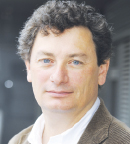
Stephen J. Schuster, MD
As reported in The New England Journal of Medicine by Stephen J. Schuster, MD, of Abramson Cancer Center, University of Pennsylvania, and colleagues, the international phase II JULIET trial has shown high response rates with the chimeric antigen receptor (CAR) T-cell therapy tisagenlecleucel in adult patients with relapsed or refractory diffuse large B-cell lymphoma (DLBCL).1 The trial supported the recent approval of tisagenlecleucel in this setting.
Study Details
Between July 2015 and the data cutoff date in December 2017, 238 patients were screened and 165 patients were enrolled at 27 sites in 10 countries in North America, Europe, Australia, and Asia; 50 discontinued the study before infusion, and 4 were awaiting infusion at data cutoff. Thus, 111 (67%) patients received a tisagenlecleucel infusion, 93 of whom received tisagenlecleucel manufactured in the United States at least 3 months before the cutoff date and were included in the analysis. (A separate cohort treated with tisagenlecleucel manufactured in the European Union will be analyzed separately.)
Tisagenlecleucel in Resistant DLBCL
- Response was observed in 52% of patients treated with tisagenlecleucel, including a complete response in 40%.
- Relapse-free survival at 12 months after response was estimated to be 65%, including 79% among patients with a complete response.
Patients had to have received at least two lines of therapy, including rituximab and an anthracycline, and had to be ineligible for or have disease progression after autologous hematopoietic stem cell transplantation. Patients received a single infusion of centrally manufactured tisagenlecleucel (median dose = 3.0 × 108 CAR-positive viable T cells).
The median age of patients was 56 years (23% aged ≥ 65 years), 56% had stage IV disease, 45% had relapse after the last therapy, 55% had refractory DLBCL, and 49% had previous autologous hematopoietic stem cell transplantation. Prior to infusion, 92% of patients received bridging therapy, including combinations of rituximab, gemcitabine, etoposide, dexamethasone, cisplatin, cytarabine, ibrutinib, and lenalidomide; 93% received lymphodepleting chemotherapy (73%, fludarabine/cyclophosphamide; 20%, bendamustine).
The efficacy analysis set consisted of 93 patients who had 3 months or more of follow-up before the data cutoff date. The median time from infusion to data cutoff was 14 months. The primary endpoint was best overall response rate on assessment by an independent review committee.
Treatment Responses
Among the 93 patients in the efficacy analysis set, the response rate was 52%, with complete response in 40% of patients. Response rates were consistent across prognostic subgroups, including those based on response to previous therapy, and did not significantly differ with the type of lymphodepleting therapy. Of 37 patients with a complete response, 16 had either stable disease (4 patients) or partial response (12 patients) 1 month after infusion, which improved to complete response at a median of 2 months (range = 1–17 months).
The median duration of response had not been reached at the time of analysis, with a duration of up to 18.4 months observed at the time of analysis. Overall, 79% of patients with a complete response and 65% of patients with a response were projected to remain relapse-free at 12 months after response. The median progression-free survival was not reached among patients with a complete response; the estimated progression-free survival at 12 months was 83% among patients with a complete or partial response at 3 months. The estimated probability of survival at 12 months was 49% among all patients and 90% among those with a complete response. No differences in response rates were observed according to tumor expression of CD19 or immune checkpoint–related proteins.
Adverse Events
Among the 111 patients who received a tisagenlecleucel infusion, the most common adverse events of any grade were cytokine-release syndrome (58%), anemia (48%), pyrexia (35%), decreased neutrophil count (34%), decreased platelet count (33%), decreased white blood cell count (33%), and diarrhea (32%). Grade 3 or 4 adverse events occurred in 89% of patients, and serious adverse events occurred in 65%. Among patients with adverse events with an onset more than 8 weeks after infusion, grade 3 or 4 adverse events occurred in 49%, and serious adverse events occurred in 31%.
Grade 3 or 4 adverse events of special interest that occurred within the first 8 weeks after infusion included cytopenias not resolved by day 28 (32%), cytokine-release syndrome (22%), infections (20%), febrile neutropenia (15%), and neurologic events (12%).
The median time from infusion to the onset of symptoms of cytokine-release syndrome was 3 days, with all but 1 patient having an onset within 9 days. The median time to the onset of grade 3 or 4 cytokine-release syndrome was 4 days (range = 2–8 days), with 97% of cases resolving by data cutoff. Tocilizumab treatment was received by 14% of patients, with 10% receiving both tocilizumab and glucocorticoids. Patients received supportive care including oxygen supplementation (24%), endotracheal intubation (7%), high-dose vasopressors (6%), and dialysis (5%). Overall, 24% were admitted to the intensive care unit. Infections were concurrent with cytokine-release syndrome in 6% of patients, and grade 3 or 4 neurologic events were concurrent with cytokine-release syndrome in 8%.
Death occurred in 3 patients from disease progression within 30 days after infusion. No deaths were attributed to tisagenlecleucel, cytokine-release syndrome, or cerebral edema.
The investigators concluded: “In this international study of CAR T-cell therapy in relapsed or refractory DLBCL in adults, high rates of durable responses were produced with the use of tisagenlecleucel.”

Gilles Salles, MD, PhD

Richard T. Maziarz, MD
They noted: “The high and durable response rates observed with tisagenlecleucel treatment are promising. However, it should be noted that follow-up is short, and the potential for long-term toxic effects requires further analysis. Adverse effects such as cytokine-release syndrome can be severe or even life-threatening; however, they were managed in most patients with supportive measures and cytokine blockade. Patients with relapsed or refractory DLBCL who are not eligible for high-dose therapy and hematopoietic cell transplantation or for whom such therapy was not successful have very few treatment options. For these patients, tisagenlecleucel shows promise that will need to be confirmed through larger studies with longer follow-up.”
Gilles Salles, MD, PhD, of the Hospices Civils de Lyon, Université de Lyon, and Richard T. Maziarz, MD, of Oregon Health and Science University Knight Cancer Institute, Portland, contributed equally to The New England Journal of Medicine article. ■
DISCLOSURE: The study was funded by Novartis. Dr. Schuster is a consultant/advisor for Celgene, Pharmacyclics, Gilead Sciences, Nordic Nanovector, Novartis, Gilead Sciences, and Merck; and has received institutional research funding from Novartis, Celgene, Gilead Science, Pharmacyclics, Johnson & Johnson, Adaptive Biotechnologies, and Merck.
REFERENCE
1. Schuster SJ, Bishop MR, Tam CS, et al: Tisagenlecleucel in adult relapsed or refractory diffuse large B-cell lymphoma. N Engl J Med 380:45-56, 2019.

